The feast of Saint Ignatius of Antioch is December 20. If you’d like to read a good story, go to: https://frbillsorthodoxblog.com/2019/12/20/158-how-the-hieromartyr-ignatius-the-god-bearer-brought-2000-evangelicals-into-the-orthodox-church-in-1989/
_____________________________
Let me begin with a confession: Though I know the Orthodox Church in Russia has produced a vast number of holy men and women, for reasons I cannot explain I have never been drawn to Russia * or Russian Orthodoxy or to Russian saints. If you are, God bless you. It’s probably a weakness in me.
- Except I love for Russian classical music. Total inconsistency.
Today I’m making an exception for this modern Russian saint, who also is commemorated on December 20, this man whose life seems so much like… well, like the stories passed down about wonder workers of old. In addition, I had read a few of Saint John’s sayings, which brimmed with practical spiritual wisdom. I felt it was time to find out about more about him.
What follows here will be a brief biography, omitting much, followed by some of his profound and insightful sayings, omitting even more.
The Life of Saint John of Kronstadt
Ivan Ilyich Sergiyev was born in 1829 to a poor and very devout family in the north of Russia. He struggled in school until, as he said, he prayed very hard one evening for help, and something just “enveloped 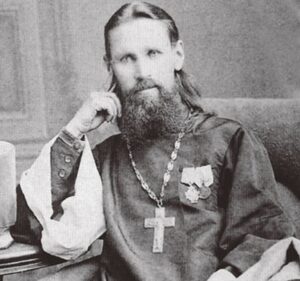 him”, and after that he graduated near the top of his class. He did equally well in seminary.
him”, and after that he graduated near the top of his class. He did equally well in seminary.
courtesy of Pravmir
Oddly, a number of accounts never mention than Ivan had a wife! Before ordination John married Elizabeth Nesvitsky, the daughter of an archpriest at Saint Andrew’s Cathedral in Kronstadt. After that he was ordained, and soon also became an archpriest at that cathedral.
Some accounts also omit the following: Immediately after his ordination, Father John told his young wife that they would no longer have sexual relations – apparently in imitation of some couples in the early Church. One account says that she found this very difficult – not surprisingly, I would think – but she decided to accept it, and that was the way it was for the rest of their lives. She and Father John had no children, for obvious reasons, but they did lovingly raise her orphaned brothers and also a niece till they came of age. They seem to have been a happy household.
You might want to read this article about the life of Father John’s wife Elizabeth, this kind, patient, benevolent, almost forgotten woman, provided by the Convent of Saint Elisabeth in Minsk, Belarus: https://blog.obitel-minsk.com/2018/05/the-wife-of-st-john-of-kronstad.html
Father John, who had a charismatic character, immediately committed himself wholly to charity, and by drawing in large donations he established a factory to provide employment for the poor. Virtually everything given to him he gave away immediately to others – even his shoes! He would sometimes walk home barefoot. Some say his wife once went to the Church authorities to complain that they didn’t have enough at home to live on.
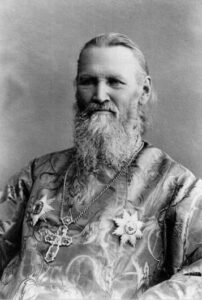 Father John served Divine Liturgy daily. He reintroduced the practice of frequent Communions, and even eased some of the Church’s odd restrictions regarding when the Eucharist could be received. For example, he allowed women to receive the Sacrament during their “periods”. All this was done over the shocked objection of Church authorities who wished to preserve the tradition of Communion being received only once of twice a year. (In this he was in fact returning to the ancient norm, which the Orthodox Church is only now recovering.)
Father John served Divine Liturgy daily. He reintroduced the practice of frequent Communions, and even eased some of the Church’s odd restrictions regarding when the Eucharist could be received. For example, he allowed women to receive the Sacrament during their “periods”. All this was done over the shocked objection of Church authorities who wished to preserve the tradition of Communion being received only once of twice a year. (In this he was in fact returning to the ancient norm, which the Orthodox Church is only now recovering.)
Father John loved to teach children, and they loved to listen to him.
People now began to come to him in enormous numbers for Confession.
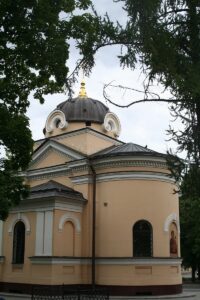 Saint Andrew’s Cathedral, Kronstadt, where Father John served for almost fifty years (Creative Commons License)
Saint Andrew’s Cathedral, Kronstadt, where Father John served for almost fifty years (Creative Commons License)
In 1882 his “House of the Industry” opened in Kronstadt, which consisted of a church, an elementary school for boys and girls, an orphanage, a free hospital, a boarding house, a free public library, a shelter for the homeless that accommodated 40,000 people each year, workshops where the poor could earn money, a cheap public canteen that served about 800 free dinners on holidays and a hostel for travelers. Does this remind you of anything? anyone? It sounds almost exactly like my patron Saint Basil of Caesarea’s “New City” for the poor.
Then began the miracles. He said it surprised and amazed him: Sick children, even a dead child recovered while he held them in his arms. At peoples’ request he began to tour Russia, healing and hearing Confessions and teaching as he went. Many Church authorities at first strongly disapproved of this. (With reason, I think. There have more “fake holy men” in the world than you can shake a stick at, as my mother used to say. Think of Rasputin in the royal court. ) However, after Father John was called in to heal the dying Tsar criticism of him died down – even though the Tsar was not healed. Father John said he had tried and failed, and that we must trust in God’s will.
Were there any negatives in Father John’s life? Yes, and they are ignored in most accounts written about him by ecclesiastics.
1) A group of enthusiastic women followers titled themselves “The Ioannites” and declared that he was almost a kind of “god”. I hope he disavowed them, but I have not read anywhere that he did.
2) Father John publicly became a bitter enemy of Leo Tolstoy, the Christian anarchist and pacifist, and wrote him “You ought to have stone hung around your neck and be lowered with it into the depths of the sea”. Jesus said that about a certain kind of sinners in general, but do we who are all sinners, even the best of us, have the right to publicly condemn individuals in that way? even though we may think it!
3) Father John could see what was soon coming upon Russia, and he properly feared and opposed it. His reaction, however, was to be publicly aligned with radical right wing organizations such as the “Union of the Russian People”, which sponsored the “Black Hundreds”, who fought against “liberals and Jews”, and endorsed pogroms against the Jews. Father John blessed flags for their marches, where they fought violently in the streets, and whose leaders organized a series of political assassinations. What might modern Russian history have been like if Russia had not got divided into two radical camps? if the “liberal” moderate social democrats not been weakened? That I can’t say. But is it for me to say that this kind of public political activity is inappropriate for a priest? Yes, it is – because it is.
Which is to say that Father John of Kronstadt was a fallible human being. Nevertheless, there is no doubting that God clearly worked through him for good in many remarkable ways.
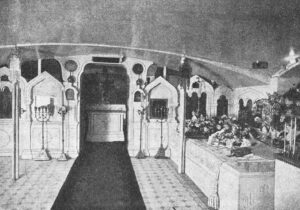 Saint John’s tomb, 1909
Saint John’s tomb, 1909
During his lifetime many considered Father John of Kronstadt to be a saint. After his death, there seemed no doubt. When he died on December 20, 1909, his funeral was attended by enormous crowds. Almost immediately thousands of people from near and far began to make pilgrimages to his tomb.
Despite desecration by the Communists, most of his relics seem to have been recovered. In 1990 Saint John of Kronstadt was was formally “glorified” (canonized) by the Moscow Patriarchate. Between 1990 and 2016, more than sixty new churches or altars in Russia (not to mention many more around the world) were dedicated to him.
The OCA site says: “Even today millions of Orthodox Christians in Russia and around the world pray to him to intercede for them as he had always done from his childhood… Saint John has performed more miracles than almost any other saint, with the possible exception of Saint Nicholas. Through his prayers he healed the sick, gave hope to the hopeless, and brought sinners to repentance.”
Some Sayings of Saint John of Kronstadt
By culling a few sources, I quickly found over 3000 words of wisdom! So I’ll hush up, and let him do the talking in the space we have left.
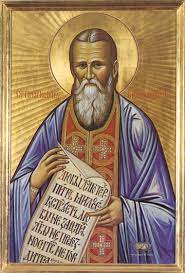 Our wickedness shall not overpower the unspeakable goodness and mercy of God; our dullness shall not overpower God’s wisdom, nor our infirmity God’s omnipotence.”
Our wickedness shall not overpower the unspeakable goodness and mercy of God; our dullness shall not overpower God’s wisdom, nor our infirmity God’s omnipotence.”
“A Christian must always be kind, gracious, and wise in order to conquer evil by good.”
By permission of Saint Isaac’s Skete at skete.com
“Love does not reflect. Love is simple. Love never mistakes. Likewise believe and trust without reflection, for faith and trust are also simple; or better: God, in whom we believe and in whom we trust, is an incomplex Being, as He is also simply love.”
“You are angry with your neighbor, you despise him, do not like to speak peaceably and lovingly to him, because there is something harsh, abrupt, careless, unpleasant to you in his character, in his speech, in his manners-because he is more conscious of his dignity than perhaps is necessary; or because he may be somewhat proud and disrespectful; but you yourself, your neighbor’s physician and teacher, are more guilty than him.”
“Avoid duplicity, that is, do not let your heart be divided between attachment to God and attachment to earthly things, ‘You cannot serve God and mammon’ (Mt. 6:24); cling to God alone, put your trust in Him alone; for the Devil, by inciting us to duplicity, seeks himself to gain possession of our heart, which is single and indivisible.”
“Remember that God, during your prayers, is watching for your affirmative answer to the question which He is inwardly asking you: ‘Do you believe I am able to do this?’ To which question you must from the depth of your heart reply, ‘Yes, Lord’”
“The longer we remain without confessing, the worse it is for us, the more entangled we become in the bonds of sin, and therefore the more difficult it is to give an account.”
“It is necessary for a Christian to fast, in order to clear his mind, to rouse and develop his feelings, and to stimulate his will to useful activity. These three human capabilities we darken and stifle above all by ‘surfeiting, and drunkenness, and cares of this life’ (Lk. 21:34).”
“As the Holy Trinity, our God is One Being, although Three Persons, so, likewise, we ourselves must be one. As our God is indivisible, we also must be indivisible, as though we were one man, one mind, one will, one heart, one goodness, without the smallest admixture of malice – in a word, one pure love, as God is Love. That they may be one, even as We are One (John 17:22).”
“Every man on earth is sick with the fever of sin, with the blindness of sin and is overcome with its fury. As sins consist mostly of malice and pride, it is necessary to treat everyone who suffers from the malady of sin with kindness and love. This is an important truth, which we often forget. Very often we act in the opposite manner: we add malice to malice by our anger, we oppose pride with pride. Thus, evil grows within us and does not decrease; it is not cured – rather it spreads”
“The Christian has no reason to have in his heart any ill-feeling whatever against anyone–such ill-feeling, like every other evil, is the work of the Devil; the Christian must only have love in his heart; and as love cannot think of evil, he cannot have any ill-feeling against others.”
“Hearty faith is indispensable for man, because the light of our intellect is very limited, and cannot contain much mental light, while the Lord our God is Infinite Light, and the world is an abyss of His omnipotence and wisdom, whilst in us there is only, so to say, a drop of His power and wisdom, because only so much, and not more, can be contained of them in our perishable flesh.”
“For you cannot conquer evil with evil, just as you cannot put out fire by fire, but only by water.”
“What is a pure heart? It is meek, humble, guileless, simple, trusting, true, unsuspicious, gentle, good, not covetous, not envious, not adulterous. My soul! remember thy heavenly dignity and do not be disturbed by corruptible, worthless things. Honour also in other people their heavenly dignity, and do not dare offend or hate them for any perishable cause; love with all thy might that which is spiritual and heavenly, and despise that which is material, earthly.”
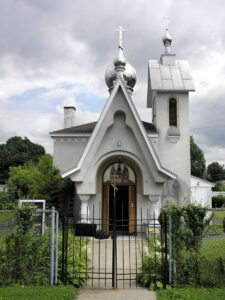
Saint John of Kronstadt Russian Orthodox Church, Utica, New York – said to be the first church in the world to be dedicated to him (Creative Commons licens
“What is a pure heart? It is meek, humble, guileless, simple, trusting, true, unsuspicious, gentle, good, not covetous, not envious, not adulterous. My soul! remember thy heavenly dignity and do not be disturbed by corruptible, worthless things. Honor also in other people their heavenly dignity, and do not dare offend or hate them for any perishable cause; love with all thy might that which is spiritual and heavenly, and despise that which is material, earthly.”
“Do not be irritated either with those who sin or those who offend; do not have a passion for noticing every sin in your neighbour, and for judging him, as we are in the habit of doing. Everyone shall give an answer to God for himself. Everyone has a conscience; everyone hears God’s Word, and knows God’s Will either from books or from conversation with other people. Especially do not look with evil intention upon the sins of your elders, which do not regard you; ‘to his own master he stands or falls.’ Correct your own sins, amend your own life.”
“Our self-love and pride manifest themselves especially in impatience”
“The earth is hard and inert, though it revolves very fast round the sun; water is liquid and rapid, therefore people say a current is rapid; air is still more liquid, more rare- fied and more rapid, and therefore it moves very quickly, as, for instance, in the case of winds; light is still more ethereal, more rapid, and in one second it travels over incredibly great distances. If light is so ethereal and traverses immense spaces in the shortest possible time, then what must the created spirit be, and how ethereal and rapid must it be! Finally, what must the uncreated Spirit be–the Lord Himself! How immeasurable must He be! If light in one second moves with such awful rapidity, then how rapidly must the uncreated Light–the Source of all Light and of everything created–move in intelligent created spirits! Finally, how must the Light which created everything embrace all His creatures, all the multitudes of worlds! Glory to Thee, the Light immaterial and uncreated, ‘which lighteth every man that cometh into the world.’”
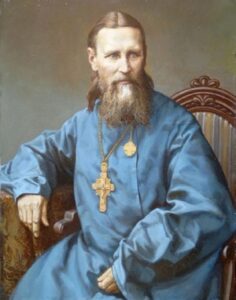 courtesy of Pravmir
courtesy of Pravmir
“People offend you, irritate you, breathe contempt and malice against you; do not repay them in the same way, but be gentle, meek, and kind, respectful and loving towards those very persons who behave unworthily to you.”
“Forgive those who trespass against you, so that God may forgive your trespasses, incomparably greater than the trespasses of others against you.”
“Dislike, enmity, or hatred should be unknown amongst Christians even by name. How can dislike exist amongst Christians? Everywhere you see love, everywhere you breathe the fragrance of love. Our God is the God of love. His kingdom is the kingdom of love.”
“For to be carnally minded is death; but to be spiritually minded is life and peace.”
________________________________________________________
If you’d like to hear more of his words (and why ever would you not?), look up “Sayings of Saint John of Kronstadt”. Or better, read his autobiography: My Life in Christ.
In this Post, I have gathered information from these sources:
https://orthodoxwiki.org/John_of_Kronstadt
https://www.oca.org/saints/lives/2020/12/20/103598-repose-of-saint-john-of-kronstadt
https://www.goarch.org/chapel/saints?contentid=2288
https://en.wikipedia.org/wiki/John_of_Kronstadt
The following article is said to be about the feud between Father John and Leo Tolstoy, but most of it is about Father John’s life: https://www.rbth.com/history/332995-john-kronstadt-russian-saint
Next Week: We will sing The Nativity of Our Lord.
Week after next: I’m thinking about it. I’m thinking about it.
My question is his support at the end of his life of the groups that were pretty rough. Thoughts?
Bruno, as I think you could tell from my comments in the Post, I think his endorsement of far right wing Russian nationalists was a serious blot on his life, to put it mildly. However, it is the people of the Church who decide who is a saint. The people of Russia began venerating Saint John, and apparently he has worked miracles. God is forced to work through imperfect people.
That is not to say we should choose to vote for people whom we know to be sinners, crooks with serious personality defects.
Also, I think it is wrong for many Evangelical groups in America to endorse American right wing nationalism. And also for the liberal Protestant denominations to endorse left wing politics. I believe the Church should speak to social issues, but not get itself entrapped by politics, especially extremist politics.
I feel a Post coming on. Thanks, Bruno.